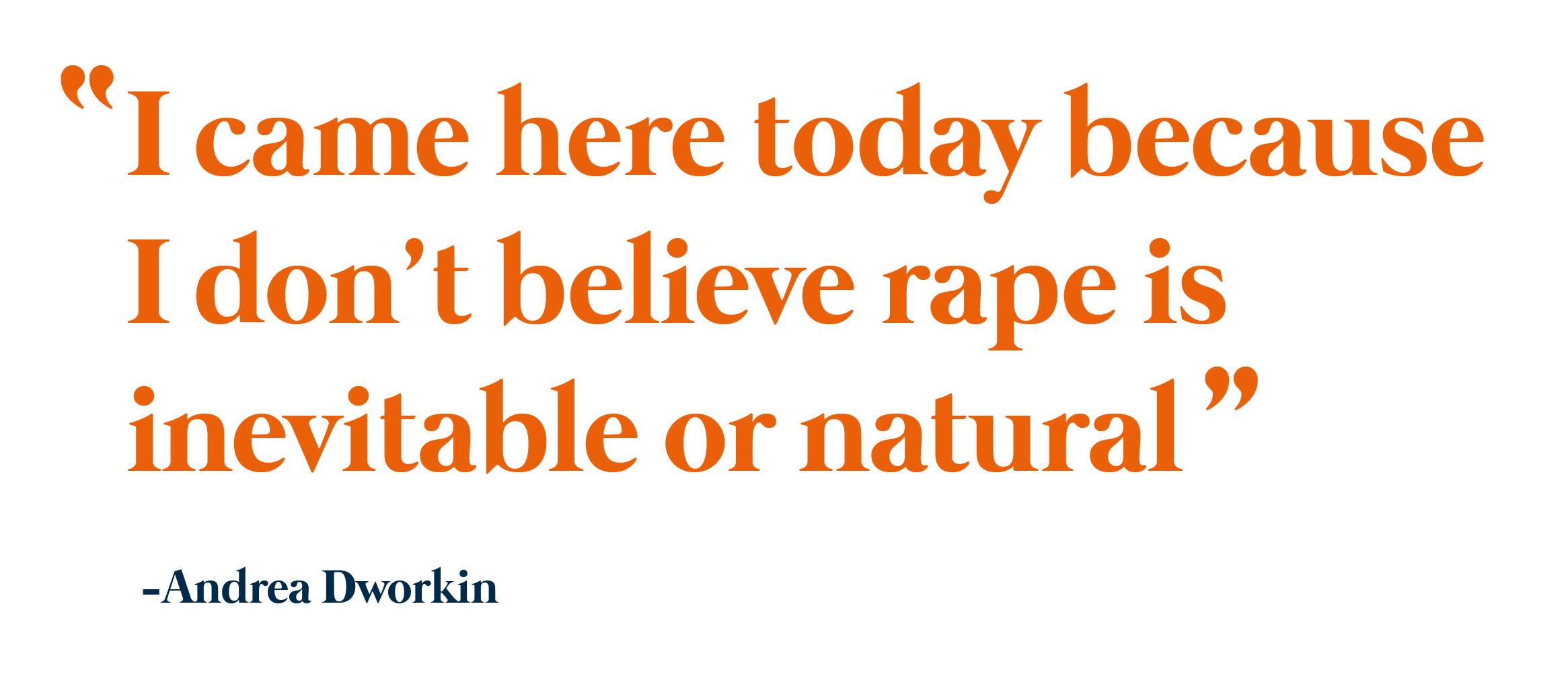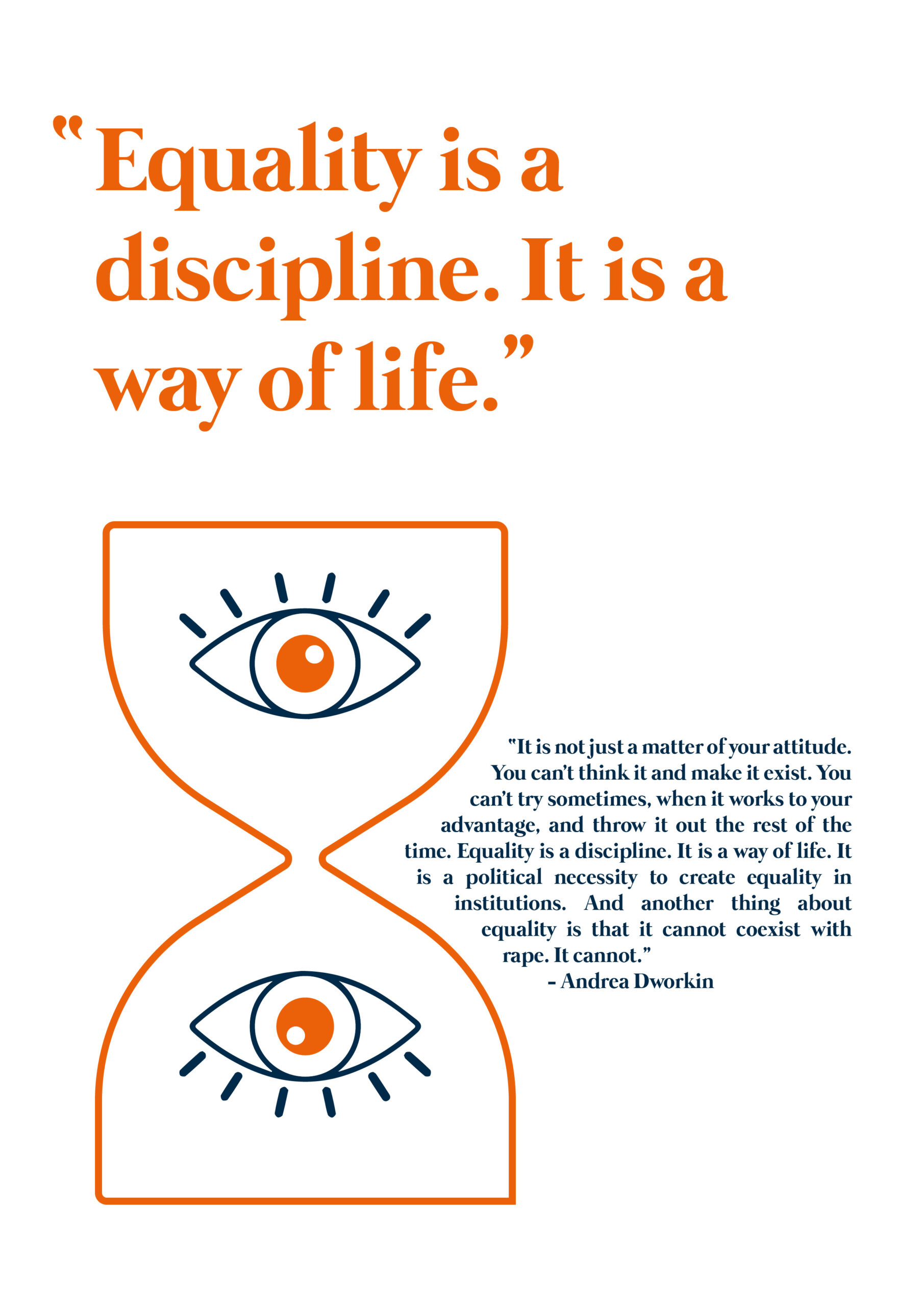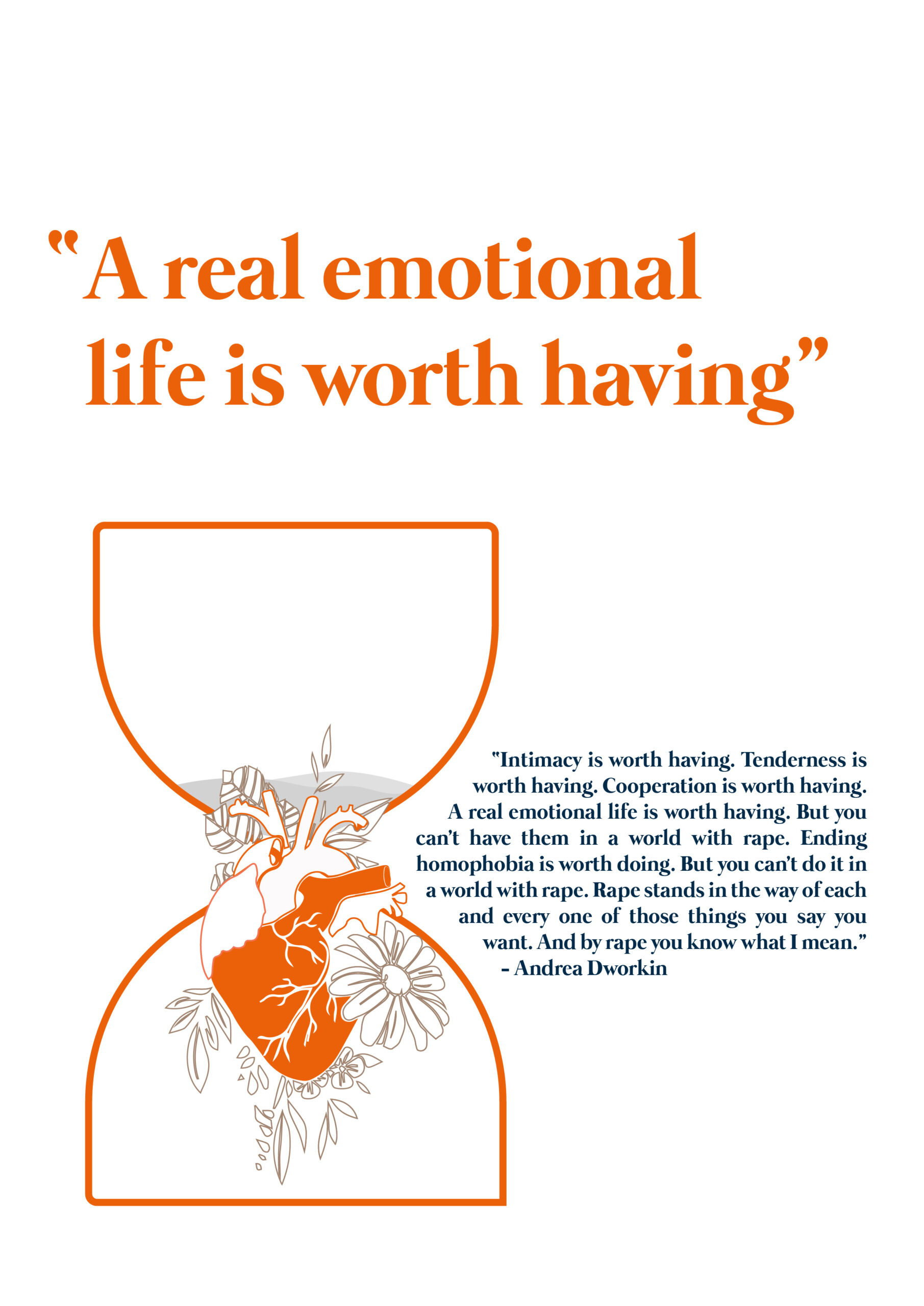VOICE'S 24-HOUR TRUCE SERIES: Volume II

From VOICE founder Mendy Marsh:
VOICE exists because we don’t believe that violence against women is inevitable or a normal part of conflicts, disasters, and so-called “normal” times. We exist to disrupt the status quo in the humanitarian system and beyond; to center actions to address violence against women and girls on what we know is necessary.
We exist because multiple forms of violence against women and girls, including sexual violence, continue to persist across generations, and we know that this is related to systemic failures. VOICE is one organization in an ever-growing ecosystem that is fueled by the frustrations of women and girls. The feminist movements we lead to address violence against women and girls continue to stand the test of time.
Andrea Dworkin’s speech is directed towards men, as it should be. Her speech does not put the burden of the fight to eradicate sexual violence on women. VOICE has chosen to invoke Andrea Dworkin’s speech, written 37 years ago, because it is as relevant today as it was then. We have just seen the global community come together in recognition of 25 years of the Beijing Declaration and Platform of Action on Gender Equality. The Beijing Declaration and Platform of Action was the most historic vision ever created for women, as it conceptualized equal rights, freedom from violence, and opportunities for women everywhere. This vision continues to shape efforts to address gender equality and women’s movements around the world.
VOICE is highlighting these struggles and progresses from the perspective of Time to emphasize the generations of women and girls that have fought for gender equality before us, and to acknowledge just how far we still have to go to free all women and girls from violence. Just a month ago, Generation Equality 2021 concluded as a celebration of the 25th anniversary of the Beijing Platform. At the Paris Forum in July 2021, ambitious policy and program commitments were made alongside bold investments to fund the new action-oriented agenda. However, at VOICE we fear that we will have to, yet again, invoke Andrea Dworkin’s speech another 25 years from now. This is especially important considering the critical gains that have been lost for women and girls around the world due to the ongoing COVID-19 pandemic. At VOICE we think the question should still be: what will it take to stop sexual violence against women and girls?
Systemic action is needed, because we know it is not just a few bad men. We know that it is primarily men who misuse their power and continue to rape and sexually assault women and girls the world over. Global patriarchal structures and organizations still allow for a world where there is not a place nor a moment in time where women and girls are free from the fear of men’s violence against them.
We need resources that allow our feminist movements to grow and become more sustainable places of recognition and replenishment, and platforms for re-centering women and girls everywhere - rather than places of labor. These spaces in particular often become saddled with demands to accommodate programming and concepts like male engagement. Women and girls bear the burden of oppression already: Along with increased caregiving responsibilities, we face the continued feminization of poverty, and the ever-growing barriers to healthcare and other essential services. These burdens will continue to profoundly threaten women and girls’ safety and well-being, economic security, and participation in public life and political life after the pandemic. Please do not continue to place the burden of responsibility for the violence that men perpetuate upon us as well. Let’s not forget - it’s largely men that have gotten us into this pandemic, and we know it will be women’s leadership and movements that will get us out of it.

by Natasha Simone Alexenko
When you ask “what about the bystanders?” you envision someone that intervenes during an act of sexual violence. This is such a myopic viewpoint. Every single day, you are a bystander. It is your responsibility to intervene not just against an act but against words, against behaviors, against degradation of women on any level and in any way. This is how you truly end acts of sexual violence against women. And do not assume someone else will take action.
Perhaps you are inhibited by the belief that those around you will negatively judge you for intervening when you hear something or see something that you know is ill behavior. Understand that every moment of every day we feel judged.
Many of us feel as though we are wearing a sign that announces to the world that we are survivors. Some of us feel as though we wear it on our skin. We immediately know that we will be judged by our circumstances and that you will make assumptions about who we are. You will base your assumptions upon what you think you know before you will get to know us.
What does it look like to be a bystander in the aftermath? Treat us as more than just an event that shook our lives. We are a tapestry of actions that have molded and shaped us. We are unique and varied. We don’t need to be understood, managed, or approached as ‘survivors’. We need to be heard as women who move through a dangerous world in spite of the realities, in spite of what’s been done to us.
Before and after my assault my personal mission on this planet has remained steadfast – to leave this world a better place than it was before I existed. The violence, the aftermath and the courtroom changed absolutely nothing about who I am fundamentally.
The aftermath is where you live. Your expectations of me differed from what I felt inside. Sometimes, I tried to fit into the box you offered me, thinking you were being kind. “You are doing so well for what you went through,” you’d announce, expecting me to thank you in return. And I did. I heard the whispers when you thought I couldn’t hear you. “I wonder what she would be like if that had never happened to her.”
I cannot and will not speak for other survivors because our experiences and how we view the world is unique to us as individuals. I do not share their stories without permission and I refuse to place any sort of expectations upon my fellow survivors. You should follow this same standard because all of us should walk upon this earth as though we are survivors too. Think of this for a moment. What would it feel like if who you were fundamentally was overshadowed by an experience and if violence traveled with you everywhere you went? How would you hope to be viewed and treated?
You may never find yourself in a position where you must intervene as a bystander in an act of violence against a woman as it is happening – but you are a bystander every day. The likelihood of you knowing other survivors is very high and you may not even be aware. We have a choice whether or not to share our stories and we have every right to have control over that decision. What will you do to end the vicious cycle?

by Nida Mushtaq
What does a real emotional life look like? A life where desires, intimacy, pleasure, vulnerability, and love can be had, without fears. A life where our imagination is not contained by social expectations and norms. A life where everyday living is not a navigation around societal barriers and a fight against structural ones. A real emotional life begins with a fundamental sense of safety. Feeling safe - in the body, in our homes, on the streets, in crowds and alone, in this world - in its economies and systems. That is the starting point.
How many women do we feel think safe in their bodies, in this society, in the world today? What kind of emotional lives
can be led by women in the presence and prevalence of domestic violence, intimate partner violence, revenge porn, revenge rape and the various forms of verbal and emotional abuse and economic coercion faced by women everyday by their closest relations, everywhere? With stories of patriarchal violence all around us, how do we imagine a real emotional life as feminists? The statistic become useless when we ask these questions. The answers are in the stories that we tell and hear everyday, as women.
Women are the historical victims of patriarchy. Even as brave, courageous, resisting women, in our emotional lives, most of our relationships are impacted by patriarchy. Our sexuality, desires, and intimate relationships are always at a risk of being shaped by patriarchy - be it by residual conditioning or by our defiance of it. The framework remains determinant.
But as Andrea Dworkin reminds us. A real emotional life is worth having. Intimacy is worth having. Tenderness is worth having. And this needs to be on our feminist agenda to reclaim and reshape on feminist terms. Patriarchy is an archaic concept fundamentally built for production and consumption. The rules of patriarchy are not made for intimacy and emotional well-being. A new feminist vision is needed on how we relate to each other in this society - for the ground on which our romantic, intimate, sexual relationships stand on. It is worth fighting for.
